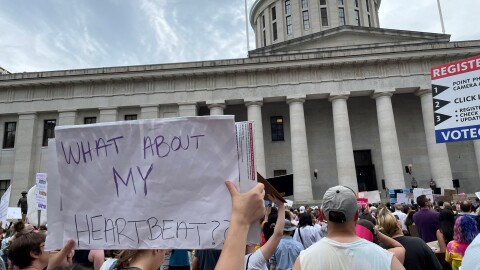A lawsuit has been filed with the Ohio Supreme Court to block the state's six-week abortion ban.
The American Civil Liberties Union, the ACLU of Ohio, Planned Parenthood Federation of America, and the law firm WilmerHale filed the court challenge Wednesday morning, seeking to block the state’s six-week ban on abortion, sometimes referred to as the "heartbeat" law, that went into effect Friday.
A federal judge granted the state’s request to allow the previously blocked law to take effect. The law had been put on hold because it violated constitutional protection provided by Roe v. Wade but after the U.S. Supreme Court's decision Friday morning, the state argued there was no reason to have a hold on the law.
The new law, SB23, restricts access to abortion in Ohio by lowering the gestational age limit from 22 weeks to approximately six weeks, with very limited exceptions.
It doesn't pose penalties on the woman seeking an abortion, but a doctor who performs an abortion once "fetal activity" can be heard could be charged with a fifth-degree felony.
Clinics that perform abortions throughout the state canceled nearly all abortions Friday after the new state law was put in place. Now those same clinics are parties in this lawsuit.
“This sweeping measure, which prevents nearly every pregnant person from accessing essential care, is blatantly unconstitutional under Ohio’s state constitution which has broad protections for individual liberties. We ask the Ohio Supreme Court to stop enforcement of Senate Bill 23. Absent action from the court, many Ohioans will be forced to give birth against their will, many will have illegal or dangerous abortions, and some will die," said Freda Levenson, legal director for the ACLU of Ohio.
Levenson added that people of color and low-income communities — who make up the majority of patients seeking abortions — will be disproportionately impacted by the new ban.
Since Friday, some Ohioans seeking abortions have had to travel out-of-state to get those services. The lawsuit contends the need to travel out-of-state deprives many low-income and minority pregnant people from being able to get the same medical care as wealthier or white pregnant people.
The plaintiffs are asking the Ohio Supreme Court to order state officials not to enforce SB23 and to declare the ban unconstitutional.
Copyright 2022 The Statehouse News Bureau. To see more, visit The Statehouse News Bureau. 9(MDA5NTM4MTIyMDE0MTg3NDc2MTVlZjdmNQ001))




